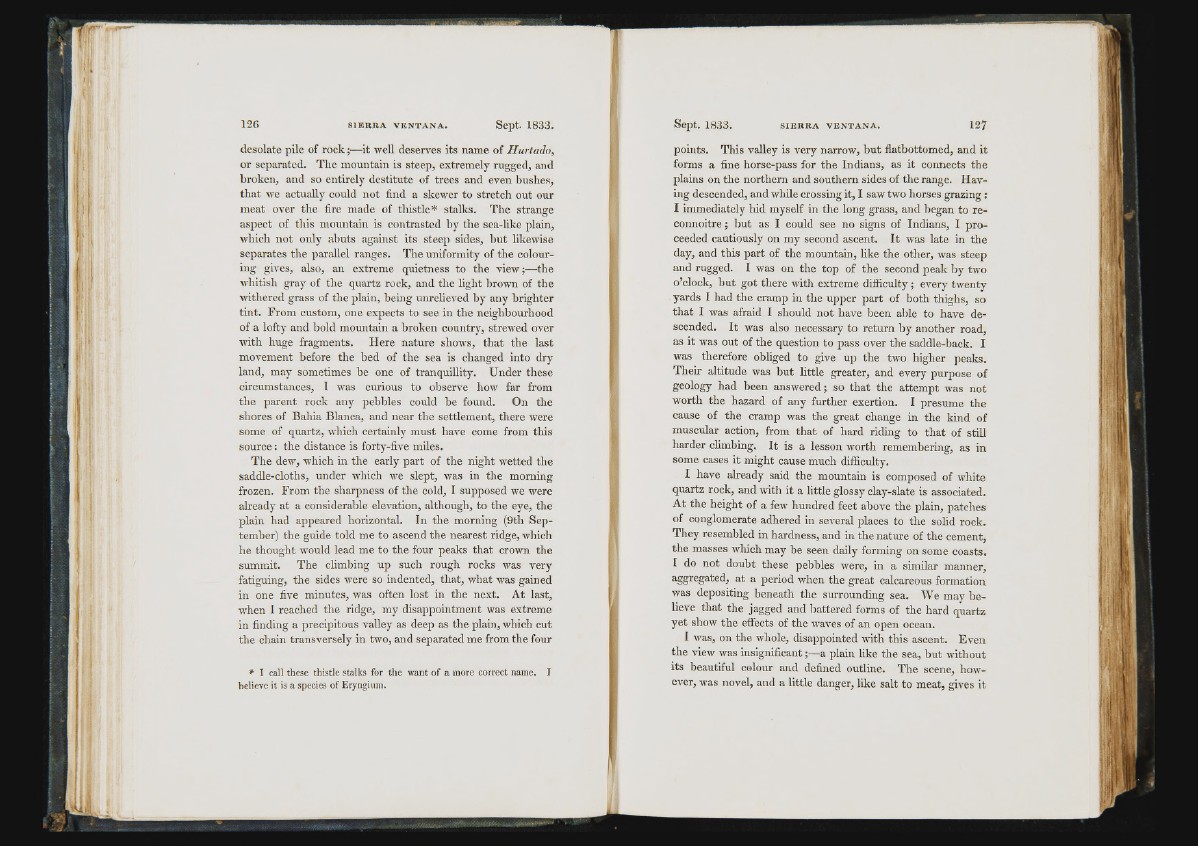
desolate pile of rock;—it well deserves its name of Hurtado,
or separated. The mountain is steep, extremely rugged, and
broken, and so entirely destitute of trees and even bushe.s,
that we actually could not find a skewer to stretch out our
meat over the fire made of thistle* stalks. The strange
aspect of this mountain is contrasted by the sea-like plain,
which not only abuts against its steep sides, but likewise
separates the parallel ranges. The uniformity of the colouring
gives, also, an extreme quietness to the view;—the
whitish gray of the quartz rock, and the light brown of the
withered grass of the plain, being unrelieved by any brighter
tint. From custom, one expects to see in the neighbourhood
of a lofty and bold mountain a broken country, strewed over
with huge fragments. Here nature shows, that the last
movement before the bed of the sea is changed into dry
land, may sometimes be one of tranquillity. Under these
circumstances, I was curious to observe how far from
the parent rock any pebbles could be found. On the
shores of Bahia Blanca, and near the settlement, there were
some of quartz, which certainly must have come from this
source; the distance is forty-five miles.
The dew, which in the early part of the night wetted the
saddle-cloths, under which we slept, was in the morning
frozen. From the sharpness of the cold, I supposed we were
already at a considerable elevation, although, to the eye, the
plain had appeared horizontal. In the morning (9th September)
the guide told me to ascend the nearest ridge, which
he thought would lead me to the four peaks that crown the
summit. The climbing up such rough rocks was very
fatiguing, the sides were so indented, that, what was gained
in one five minutes, ivas often lost in the next. At last,
when I reached the ridge, my disappointment was extreme
in finding a precipitous valley as deep as the plain, which cut
the chain transversely in two, and separated me from the four
* I c a ll th e s e th is tle s ta lk s fo r th e w a n t o f a m o re c o rr e c t n am e . I
b e lie v e i t is a sp e cie s o f E ry n g ium .
points. This valley is very narrow, but flatbottomed, and it
forms a fine horse-pass for the Indians, as it connects the
plains on the northern and southern sides of the range. Having
descended, and while crossing it, I saw two horses grazing:
I immediately hid myself in the long grass, and began to reconnoitre
; but as I could see no signs of Indian.s, 1 proceeded
cautiously on my second ascent. It was late in the
day, and this part of the mountain, like the other, was steep
and rugged. I was on the top of the second peak by two
o’clock, but got there with extreme difficulty; every twenty
yards I had the cramp in the upper part of both thighs, so
that I was afraid I should not have been alile to have descended.
It was also necessary to return by another road,
as it was out of the question to pass over the saddle-back. I
was therefore obliged to give up the two higher peaks.
Their altitude was but little greater, and every purpose of
geology had been answered; so that the attempt was not
worth the hazard of any further exertion. I presume the
cause of the cramp was the great change in the kind of
muscular action, from that of hard riding to that of stlU
harder climbing. It is a lesson worth remembering, as in
some cases it might cause much difficulty.
I have already said the mountain is composed of white
quartz rock, and with it a little glossy clay-slate is associated.
At the height of a few hundred feet above the plain, patches
of conglomerate adhered in several places to the solid rock.
They resembled in hardness, and in the nature of the cement,
the masses which may he seen daily forming on some coasts.
I do not doubt these pebbles were, in a similar manner,
aggregated, at a period when the great calcareous formation
was depositing beneath the surrounding sea. We may believe
that the jagged and battered forms of the hard quartz
yet show the effects of the waves of an open ocean.
I was, on the whole, disappointed with this ascent. Fven
the view was in s ig n if ic a n t a plain hke the sea, but without
its beautiful colour and defined outline. The scene, however,
was novel, and a little danger, like salt to meat, gives it
ii
. i i ,
|S|